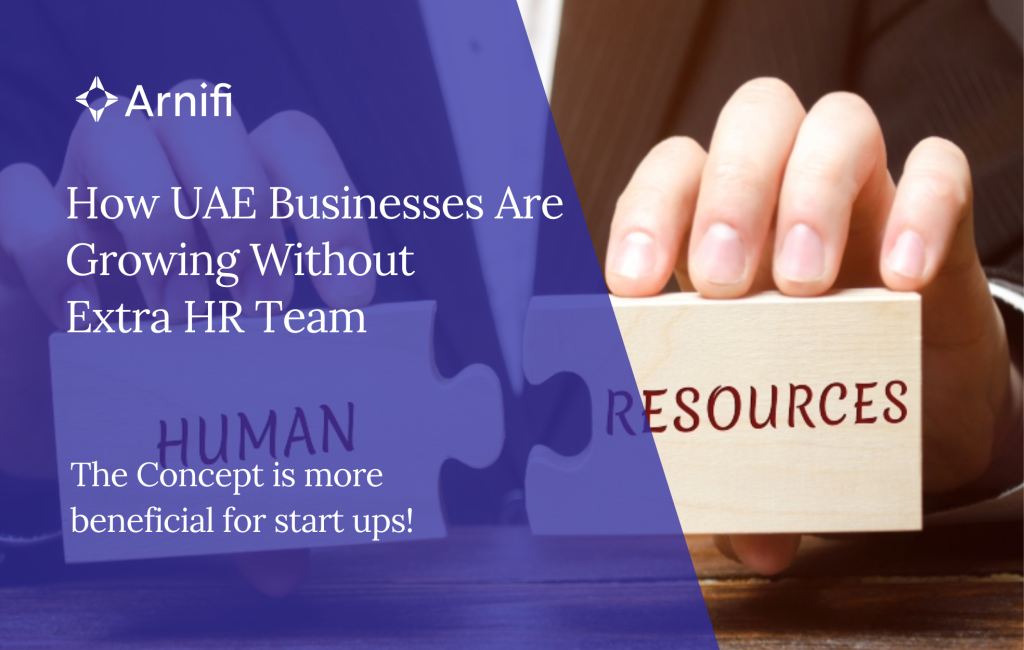How UAE Businesses Are Growing Without Extra HR Staff
by Shethana May 15, 2025  7 MIN READ
7 MIN READ

Not long ago! Having an HR department was non-negotiable for growing companies. It was assumed that once you had more than 10 or 20 employees, someone needed to handle payroll, recruitment, leave management, contracts, and performance issues. But across the UAE today, a noticeable shift is taking place more and more businesses are growing without expanding their HR departments.
Instead of hiring HR staff, they’re leaning on external partners, digital platforms, and flexible support models like EORs (Employers of Record). This is especially true for SMEs and startups that are trying to keep things lean without falling foul of labour laws.
This raises a big question: Can a business really grow without HR? And if it can, does that model suit everyone?
Table of contents
- Why Some Companies Are Choosing Not to Build HR Teams
- Real Example: A Cleaning Services Company in Ajman
- Does This Model Work for Everyone?
- What Gets Outsourced (and What Doesn’t)
- Technology Is Helping Too
- Benefits for Small Businesses
- Where the Model Breaks Down
- Final Thoughts
- Check What Arnifi’s HR Solutions Offer
Why Some Companies Are Choosing Not to Build HR Teams
The decision often starts with money. Hiring even a single HR generalist in the UAE can cost AED 12,000–18,000 per month when you include benefits, visa costs, and office space. For a startup or small business, that’s a big chunk of budget that could otherwise go toward sales or product development.
Then there’s the complexity of HR itself. UAE labour law has its own nuances, such as mandatory end-of-service benefits, WPS (Wage Protection System) requirements, visa quotas, and compliance with Emiratisation policies. Handling all that in-house requires experience and time. Many small companies simply don’t have either.
So, instead of building an HR team, these businesses are choosing HR outsourcing in the UAE through providers that offer plug-and-play solutions, covering payroll, visa processing, employment contracts, and compliance management.
Real Example: A Cleaning Services Company in Ajman
Consider CleanWell, a cleaning startup based in Ajman. They won their first big contract in 2022, a three-year cleaning contract for a large residential community. They needed to hire 40 workers within six weeks, but they had no in-house HR and no prior experience managing visa quotas or labour accommodation.
Rather than building an HR department from scratch, they partnered with an EOR. This external firm handled everything from employee visas to housing and payroll setup. The CleanWell founders remained focused on managing schedules, training staff, and satisfying the client.
In the first year, their revenue tripled, and they managed to scale to 80 workers without adding a single HR employee. They now treat HR as an outsourced function, similar to how they manage legal and IT support.
Does This Model Work for Everyone?
Not quite.
For small businesses with predictable operations and blue-collar staff, outsourcing HR can work brilliantly. It simplifies hiring, ensures legal compliance, and avoids the cost and risk of in-house hiring mistakes.
But for larger businesses or companies with complex organisational structures, the model starts to show cracks.
Take TechNova, a mid-sized technology firm in Dubai with around 300 employees, including software developers, sales teams, and support staff. They tried relying on outsourced HR during their first growth phase, using software for payroll and a consultant for legal compliance. But over time, problems started to pile up — inconsistent onboarding experiences, poor employee feedback handling, and delays in leave management.
Eventually, they built an in-house HR team to take control of employee engagement, performance reviews, and cultural alignment. The CEO later said in an interview, “You can outsource processes, but not relationships.”
So while HR outsourcing in the UAE helps with processes, it’s not always the answer for building team culture or handling strategic growth decisions.
What Gets Outsourced (and What Doesn’t)
Businesses that run without an HR team usually outsource the following:
- Payroll and WPS submission
- Employment contracts
- Visa and PRO services
- Grievance handling and termination paperwork
- End-of-service calculations
- Health insurance coordination
What they usually don’t outsource are:
- Performance management
- Training and development
- Culture and internal communication
- Strategic planning around talent
For companies hiring primarily blue-collar workers construction firms, delivery companies, cleaning businesses, etc. These “non-outsourced” items often aren’t a priority. The focus is on keeping staff compliant, paid, and on the job.
But for knowledge-based firms and larger teams, these elements become essential, and at some point, outsourcing reaches its limits.
Technology Is Helping Too
Another reason why businesses can afford to skip hiring HR staff is the growing number of HR tech platforms in the UAE. Solutions like Bayzat, RemotePass, Deel, and others offer cloud-based tools for:
- Employee self-service (leave, expenses, payslips)
- Digital contracts and document storage
- Benefits management
- Automated payroll with WPS integration
These platforms can handle what used to take an entire HR team, especially for companies with under 100 employees. And they integrate easily with outsourced HR partners, making it easier to run lean.
Benefits for Small Businesses
For small business owners, skipping HR means:
- Lower fixed overheads
- Faster hiring via EOR or labour supply partners
- Fewer compliance risks when using trusted outsourcing providers
- More time to focus on growth, not admin
They’re not ignoring HR — they’re just getting it done differently.
HR outsourcing in the UAE has created an ecosystem where entrepreneurs no longer feel the need to become labour law experts. They simply partner with someone who already is.
Where the Model Breaks Down
For larger firms, especially those crossing the 200–300 employee mark, things change.
Internal alignment becomes more critical. You can’t rely on external partners to manage culture, learning paths, or performance improvement plans. These things require context, empathy, and a daily presence.
Also, larger teams mean more complexity: different departments, different contracts, varied KPIs, and more legal risks. Managing all that remotely or through a third party becomes difficult and often inefficient.
Some big businesses do use EORs — but usually only for contract or project-based workers, not their core teams.
Final Thoughts
The idea of running a growing business without HR staff might have seemed unthinkable ten years ago. But today, in the UAE, it’s becoming normal, especially among SMEs and startups working with blue-collar workers.
Instead of building internal departments, these companies are outsourcing everything from visa processing to payroll through EORs and tech platforms. It saves them time, cuts costs, and lets them focus on winning clients and scaling up. However, that approach won’t work forever. Larger companies with complex teams and culture-focused missions will still need HR staff, just not as early or as heavily as before.
So yes, a business can grow without HR if it chooses the right partners, knows when to outsource, and understands when it’s time to bring HR back in-house.
Check What Arnifi’s HR Solutions Offer
Arnifi HR solutions ease the hiring process in the UAE as everything fully complies with labour laws, visas, WPS, and insurance, thereby eliminating legal risks. No local entity setup is required, which means some time and cost savings. Quick and efficient onboarding means your team can begin work within a matter of days.
From basic to premium, our flexible plans cater to the needs and budgets of different businesses. And with the fully transparent pricing, you’ll never have to worry about hidden fees. For hassle-free, compliant, efficient, and affordable hiring in the UAE, look no further than Arnifi HR. For better understanding, Get a free consultation now!
Top UAE Packages

Related Articles
Top UAE Packages



